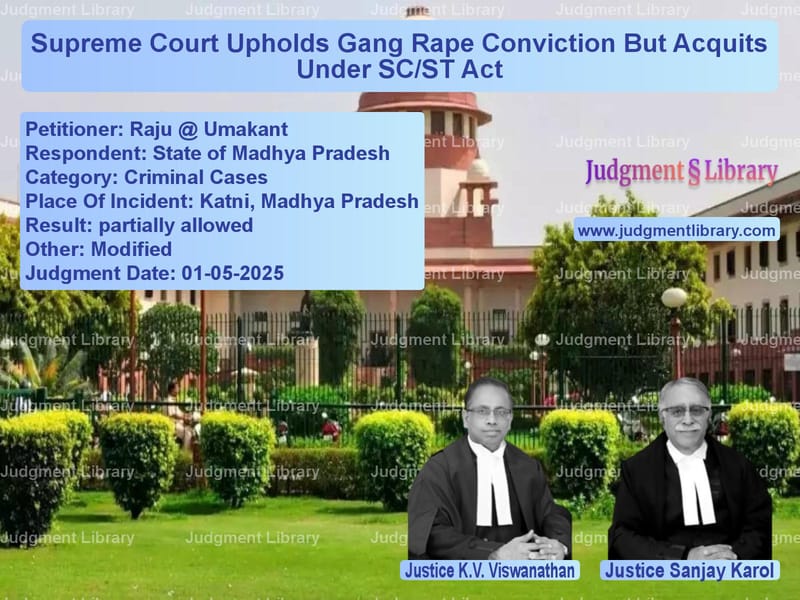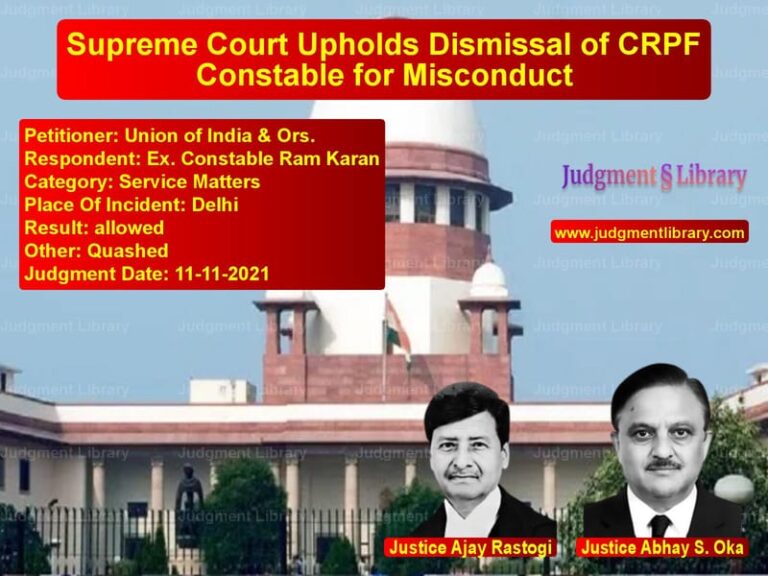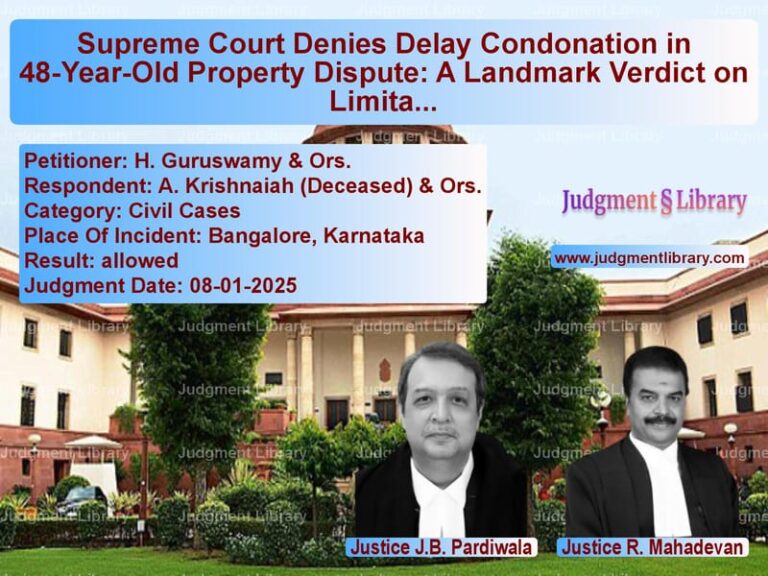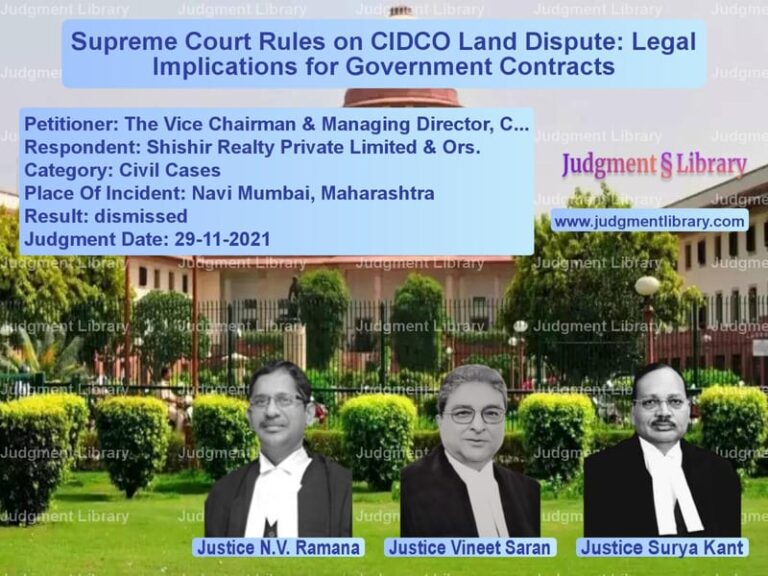Supreme Court Upholds Gang Rape Conviction But Acquits Under SC/ST Act
In the quiet hours of a June night in 2004, a young woman’s life was forever changed when what should have been a joyful return from a wedding celebration turned into a nightmare of abduction and sexual violence. The case that unfolded from that traumatic night would eventually reach the Supreme Court of India, testing legal principles around gang rape, witness credibility, and the application of special laws meant to protect marginalized communities. The journey of this case through the Indian judicial system reveals much about how courts handle sexual assault cases and the careful balance required when applying laws with enhanced punishments.
The prosecutrix, referred to as ‘R’ in court documents to protect her identity, had gone with her friend to see a wedding procession at the house of one Fagun Chaudhary in Katni, Madhya Pradesh. As they returned home around 1:00 AM, stopping briefly to attend to nature’s call, their ordinary night turned terrifying. Two men—Raju @ Umakant (the appellant) and Jalandhar Kol—emerged from the darkness, catching hold of them from behind. While the friend managed to escape, ‘R’ was not so fortunate. The men gagged her mouth, threatened to kill her if she raised an alarm, and forcibly took her on a motorcycle to a house in the middle of fields.
The Prosecution’s Case
The prosecution alleged that both men subsequently raped ‘R’ in that isolated house. She was then moved to another location in Dair Salaiya, where she remained confined for two days before being recovered by police from the house of ‘LB’, a woman with whom appellant Raju had a relationship. The case began with a missing report filed by ‘R’s father on June 24, 2004, and culminated in her recovery on June 28, 2004.
When police recovered ‘R’, she gave a statement that led to the registration of FIR No. 113/2004 under Sections 376, 363, 366, 342, 506/34 of the Indian Penal Code and Section 3(1-12) of the Scheduled Castes and Scheduled Tribes (Prevention of Atrocities) Act, 1989. Initially, her statement specifically mentioned rape by Jalandhar Kol, with Raju described as helping in the commission of the offense. However, two days later, on June 30, 2004, she gave another statement through her father that clearly implicated both men in the sexual assault.
The Trial Court convicted both accused persons, sentencing Raju to life imprisonment for offenses under Section 376(2)(g) IPC (gang rape) and Section 3(2)(v) of the SC/ST Act, along with other sentences for abduction and wrongful confinement. The High Court confirmed these convictions, leading to the present appeal before the Supreme Court.
The Supreme Court’s Analysis
The Supreme Court bench comprising Justice K.V. Viswanathan and Justice Sanjay Karol carefully examined the entire evidence, including calling for and reviewing the Trial Court records. The appellant’s counsel, Shri Susheel Tomar, raised several arguments challenging the conviction, while Shri Sarthak Raizada represented the State in defending the judgments of the courts below.
The Court first addressed the testimony of the prosecutrix (PW-1), which formed the cornerstone of the prosecution’s case. She had provided a detailed account of the abduction and sexual assault, describing how both accused persons raped her in the isolated house. The Court noted that “notwithstanding the minor contradictions, her evidence inspires confidence and that she has clearly spoken about the accused abducting her and also committing rape on her.”
The Court emphasized the settled legal position regarding the testimony of sexual assault survivors: “It is now fairly well settled that the prosecutrix is not an accomplice and that if the evidence of the prosecutrix inspires confidence it can be acted upon without corroboration.”
Elaborating on this principle, the Court quoted from precedent: “A woman or a girl subjected to sexual assault is not an accomplice but a victim of another person’s lust and it will be improper and undesirable to test her evidence with suspicion. All that the law mandates is that the Court should be alive to and conscious of the fact that it is dealing with the evidence of a person who is interested in the outcome of charge levelled by her and if after keeping that aspect in mind if the Court is thereafter satisfied that the evidence is trustworthy, there is nothing that can stop the Court from acting on the sole testimony of the prosecutrix.”
The Gang Rape Conviction
One of the key issues before the Court was the conviction under Section 376(2)(g) IPC for gang rape, particularly since the initial FIR and consent forms for medical examination specifically mentioned rape by co-accused Jalandhar Kol but were less explicit about appellant Raju’s direct involvement in the sexual assault.
The Court examined the legal framework for gang rape, noting that Explanation 1 to Section 376(2)(g) provides that “where a woman is raped by one or more in a group of persons acting in furtherance of their common intention, each of the persons shall be deemed to have committed gang rape.”
The Court highlighted the legislative history behind this provision: “In Explanation 1 to 376(2)(g) in the Criminal Law (Amendment) Bill, 1980 (which eventually became Criminal Law (Amendment) Act, 1983), it was proposed that gang rape be defined as rape committed by three or more persons acting in furtherance of their common intention. The Joint Committee of Parliament recommended that in cases of gang rape ‘even if one commits rape all the other persons involved should be held responsible and be equally punished’ and recommended that gang rape should be defined as ‘rape committed by one or more in a group of persons’.”
Citing precedent in Ashok Kumar vs. State of Haryana, the Court reiterated: “In order to establish an offence under Section 376(2)(g) IPC, read with Explanation I thereto, the prosecution must adduce evidence to indicate that more than one accused had acted in concert and in such an event, if rape had been committed by even one, all the accused will be guilty irrespective of the fact that she had been raped by one or more of them and it is not necessary for the prosecution to adduce evidence of a completed act of rape by each one of the accused.”
The Court found that the sequence of events—the abduction, wrongful confinement, and the prosecutrix’s clear testimony about being subjected to sexual assault by both accused—clearly established common intention to sexually assault her, thus attracting Section 376(2)(g).
Consent and Presumption
The defense had suggested that the prosecutrix was in a relationship with co-accused Jalandhar Kol and had consented. The Court firmly rejected this argument, invoking Section 114A of the Evidence Act, which creates a presumption about absence of consent in certain rape prosecutions.
The Court noted: “In view of Section 114A of the Evidence Act, there is a presumption as to absence of consent in case of gang rape and it will be presumed that the prosecutrix did not give consent as long as the prosecutrix states in evidence before the Court that she did not consent.”
The Court further observed: “The presumption is based on the reasoning that nobody can be consenting to several persons simultaneously.” Since the prosecutrix had clearly stated she did not consent and the defense had produced no concrete evidence to rebut this presumption, the Court found the consent argument without merit.
Medical Evidence and the Two-Finger Test
The Court addressed the medical evidence, noting that the doctor (PW-10) had stated that no definite opinion could be given about recent sexual activity and that no injuries other than one on the lip were found. However, the Court reiterated the well-settled principle that “where the ocular evidence is clear, it will prevail over the medical evidence.”
Significantly, the Court strongly condemned the fact that the prosecutrix had been subjected to the two-finger test during her medical examination, despite the test being conducted in 2004, long before the Supreme Court’s landmark judgments declaring this practice unconstitutional.
The Court quoted from State of Jharkhand vs. Shailendra Kumar Rai: “Whether a woman is ‘habituated to sexual intercourse’ or ‘habitual to sexual intercourse’ is irrelevant for the purposes of determining whether the ingredients of Section 375 IPC are present in a particular case. The so-called test is based on the incorrect assumption that a sexually active woman cannot be raped. Nothing could be further from the truth — a woman’s sexual history is wholly immaterial while adjudicating whether the accused raped her.”
The Court further emphasized: “The probative value of a woman’s testimony does not depend upon her sexual history. It is patriarchal and sexist to suggest that a woman cannot be believed when she states that she was raped, merely for the reason that she is sexually active.”
Acquittal Under SC/ST Act
In a significant part of the judgment, the Court acquitted the appellant of the charge under Section 3(2)(v) of the SC/ST Act, while maintaining his conviction under the IPC provisions.
The Court examined the legal requirements of Section 3(2)(v) as it stood at the time of the offense, which required that the offense be committed “on the ground that such person is a member of a Scheduled Caste or a Scheduled Tribe.”
The Court referenced its earlier decision in Dinesh alias Buddha vs. State of Rajasthan: “Sine qua non for application of Section 3(2)(v) is that an offence must have been committed against a person on the ground that such person is a member of the Scheduled Castes or the Scheduled Tribes.”
While the Court acknowledged the more nuanced interpretation in Patan Jamal Vali vs. State of Andhra Pradesh, which held that “conviction under this provision can be sustained as long as caste identity is one of the grounds for the occurrence of the offence,” it found that in the present case, “there was no evidence whatsoever to establish the fact that the victim’s caste identity was one of the grounds for the occurrence of the offence.”
The Court noted that the section was amended in 2016 to lower the threshold from “on the ground” to “knowing that such person is a member,” but since the offense occurred in 2004, the unamended provision applied.
Sentencing and Conclusion
While maintaining the convictions under Sections 366 (abduction), 342 (wrongful confinement), and 376(2)(g) (gang rape) of IPC, the Court modified the sentence for gang rape from life imprisonment to ten years rigorous imprisonment, bringing it on par with the sentence given to co-accused Jalandhar Kol.
The Court directed that all sentences run concurrently and that the appellant, who was in custody, should serve out the remaining sentence as modified.
This judgment demonstrates the Supreme Court’s careful approach to sexual assault cases—upholding convictions based on credible testimony of survivors while ensuring that enhanced punishments under special laws are applied only when their specific ingredients are met. The Court’s strong condemnation of the two-finger test, even in a case where the examination predated the judicial ban on the practice, reinforces the judiciary’s commitment to protecting the dignity of sexual assault survivors and eliminating regressive practices from the criminal justice system.
The case also illustrates the complex interplay between different legal provisions in sexual assault cases and the importance of precise legal analysis in ensuring that convictions and sentences are based on proper application of law rather than emotional considerations alone.
Petitioner Name: Raju @ Umakant.Respondent Name: State of Madhya Pradesh.Judgment By: Justice K.V. Viswanathan, Justice Sanjay Karol.Place Of Incident: Katni, Madhya Pradesh.Judgment Date: 01-05-2025.Result: partially allowed.
Don’t miss out on the full details! Download the complete judgment in PDF format below and gain valuable insights instantly!
Download Judgment: raju-@-umakant-vs-state-of-madhya-prad-supreme-court-of-india-judgment-dated-01-05-2025.pdf
Directly Download Judgment: Directly download this Judgment
See all petitions in Rape Cases
See all petitions in SC/ST Act Case
See all petitions in Judgment by K.V. Viswanathan
See all petitions in Judgment by Sanjay Karol
See all petitions in partially allowed
See all petitions in Modified
See all petitions in supreme court of India judgments May 2025
See all petitions in 2025 judgments
See all posts in Criminal Cases Category
See all allowed petitions in Criminal Cases Category
See all Dismissed petitions in Criminal Cases Category
See all partially allowed petitions in Criminal Cases Category







